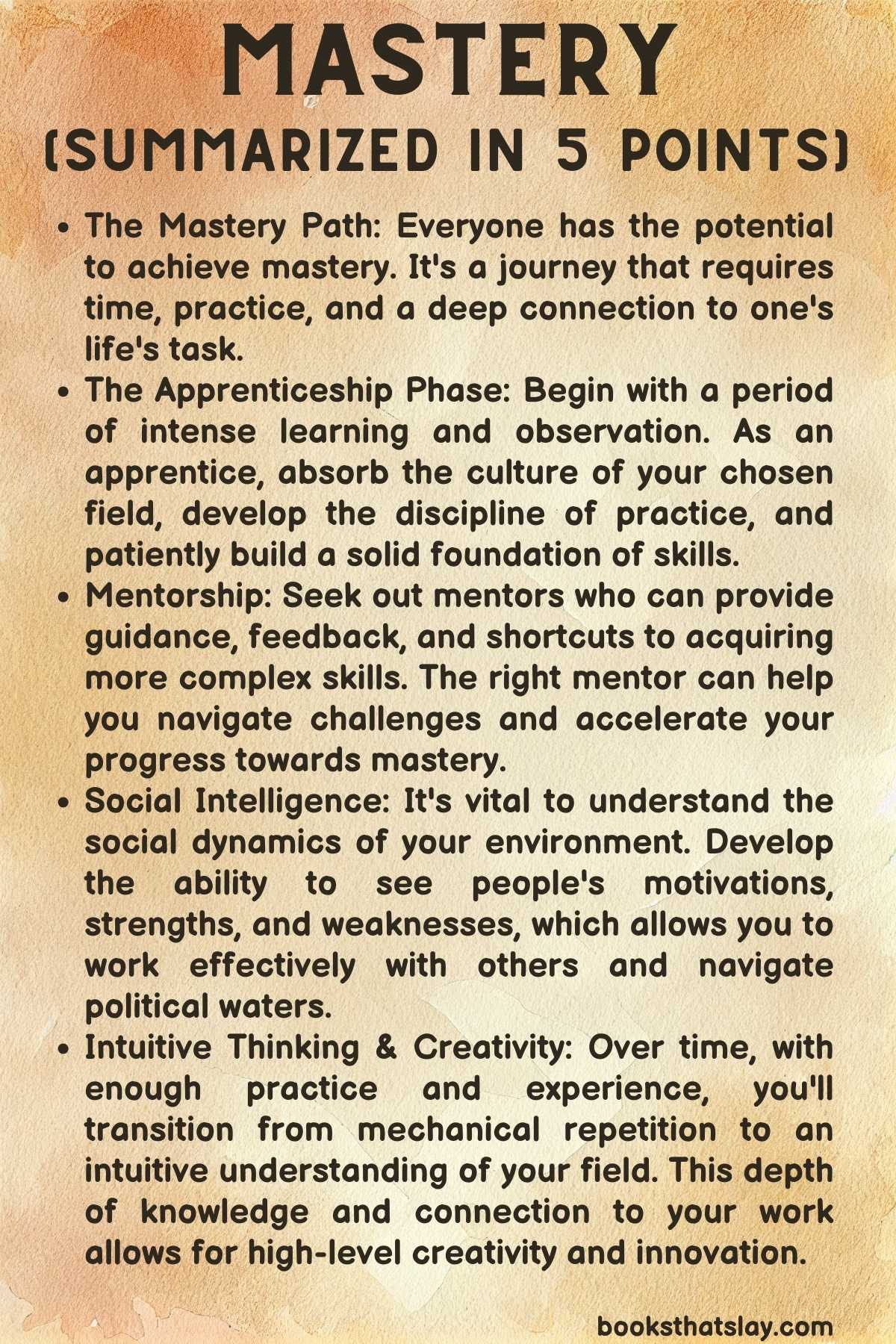Mastery Summary and Key Lessons | Robert Greene
Quick Summary: “Mastery” by Robert Greene is a book that delves into the process and journey of achieving mastery in any domain. Drawing from historical figures, contemporary masters, and relevant research, Greene explores the steps, strategies, and mindset required to achieve the highest level of skill and understanding.
Mastery Full Summary
Discover Your Life’s Task
Your calling or life’s purpose often lies at the intersection of what you’re passionate about and what you can excel in. Recognizing this early and aligning your efforts towards it can set the foundation for mastery.
Reconnect with your inclinations from childhood. Your early interests can often provide clues to your natural inclinations and potential life’s task.
Submit to Reality: The Ideal Apprenticeship
The initial phase of learning (the apprenticeship) is critical. It’s about immersing yourself in the field, observing, practicing, and making connections.
There are three essential steps in the ideal apprenticeship: deep observation, skill acquisition, and experimentation.
Commit to deep learning rather than a superficial overview.
Absorb the Master’s Power: The Mentor Dynamic
Having a mentor can significantly expedite your journey toward mastery. A mentor provides knowledge, feedback, and resources that can save years of trial and error.
However, the relationship should be symbiotic, with both the mentor and mentee benefiting.
It’s also essential to know when to move on or evolve beyond the mentor.
See People as They Are: Social Intelligence
Mastery isn’t just about technical skills; understanding people and social dynamics is vital. Developing social intelligence can prevent many of the typical problems that can sidetrack or derail one’s path to mastery.
This involves recognizing people’s motivations, becoming better at reading them, and adapting to various social situations.
Awaken the Dimensional Mind: The Creative-Active
This is the phase where you start combining the vast knowledge and skills you’ve acquired to create something new. It’s about moving from mere practice to active creation.
Greene emphasizes the importance of a fluid kind of intelligence, where you can make connections between disparate ideas or concepts, leading to innovative solutions or creations.
Fuse the Intuitive with the Rational: Mastery
True mastery is a blend of intuitive and rational thinking. One needs to be deeply immersed in a field to develop intuition about it.
Masters can see and understand more deeply than others, not because of any kind of magical insight, but because of the time they’ve spent immersed in their field and the expertise they’ve developed.
Throughout the book, Greene integrates the stories of several renowned historical and contemporary figures, such as Leonardo da Vinci, Charles Darwin, and contemporary figures like Temple Grandin, to illustrate these principles in action.
Through their stories, he explores the nuances of their journey, the challenges they faced, the strategies they employed, and the heights they achieved.

Also Read: The Rise of Superman Summary and Key Lessons
Key Lessons
The Power of the Apprenticeship Phase
Deep Observation: Before diving into a new field or skill, take the time to truly observe and understand it. This means immersing yourself without immediately trying to effect change or make your mark.
For instance, when Charles Darwin first boarded the HMS Beagle, he was not the lead scientist. However, he took this opportunity to meticulously observe, collect specimens, and keep detailed notes, which later became foundational to his work on the theory of evolution.
Skill Acquisition: In this stage, you shift from pure observation to active practice, always seeking feedback. The 10,000-hour rule, popularized by Malcolm Gladwell, echoes Greene’s sentiment here: you need deliberate practice to achieve mastery.
For example, the renowned polymath, Benjamin Franklin, diligently improved his writing skills by frequently rewriting essays from The Spectator magazine and then comparing them to the original to find areas of improvement.
Experimentation: Once a solid foundation of the skill is built, it’s time to experiment. Try different approaches, mix techniques, and learn from failures. Experimentation can lead to unique personal insights that textbooks or mentors might not offer.
It’s through this phase that individuals can begin to innovate within their field.
Developing Social Intelligence
Understand Human Nature: Recognize that people often act out of self-interest. Understanding this can help you predict behaviors, navigate complex situations, and avoid being blindsided.
Read Non-Verbal Cues: Much of human communication is non-verbal. By honing this skill, you can gauge true intentions, feelings, or potential deceit. Great negotiators or leaders often have an uncanny ability to read between the lines.
Avoid the Downward Pull: People might resist change or feel threatened by those striving for mastery. Being aware of this can help you navigate envy, sabotage, or other negative dynamics without getting derailed from your path.
Also Read: When Breath Becomes Air Summary and Key Lessons
Fusing Intuition with Rationality
Trust the Subconscious Process: After a deep immersion in a field, your brain will process information even when you’re not actively thinking about it. Sometimes, stepping away from a problem can lead to unexpected insights, as the subconscious mind continues to work.
The famous story of the chemist Friedrich August Kekulé dreaming of a snake biting its tail, leading to his realization of the structure of the benzene molecule, is a classic example.
Balance Patience with Urgency: While it’s essential to give ideas time to mature and not rush the process, it’s equally crucial not to become complacent. When you feel a strong intuition or an idea bubbling up, act on it.
Constant Feedback Loop: Always subject your intuitions to the test of rationality. This means continuously seeking feedback, testing your ideas, and being ready to adjust based on results.
Final Thoughts
Unlike Art of Seduction, “Mastery” by Robert Greene provides a roadmap to achieve mastery in any domain, emphasizing that while talent is beneficial, the process of continuous learning, practice, and dedication are the keys to achieving mastery.
Read our other summaries